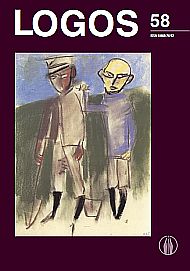Filosofija Kaip Pasauléžiûra Ir Etika Antano Maceinos Ir Juozo Girniaus Veikaluose
Philosophy as Worldview and Ethics in Works by Antanas Maceina and Juozas Girnius
Author(s): Jonas BalčiusSubject(s): Ethics / Practical Philosophy, Contemporary Philosophy, Existentialism, Philosophy of Religion, Hermeneutics
Published by: Visuomeninė organizacija »LOGOS«
Keywords: Maceina; Girnius; existence; being; interpretation; wonder; doubt; suffering;
Summary/Abstract: The article analyses works by two most famous Lithuanian philosophers in exile, namely, Antanas Maceina (1908 - 1987) and Juozas Girnius (1915-1994), such as “Origins and Meaning of Philosophy” and “Man without God”. The conceptual basis of both works in terms of philosophic and ethical views is constituted of virtualist (from Latin virtus “value”) orientation in regard to the world and humans. As emphasized in the article, it is exactly the value-oriented explication of reality that makes the essential link connecting these two Lithuanian thinkers both with Tomistic and with Platonic and existentialist interpretation of reality. It is noteworthy, that despite of the Lithuanian occupation by the Soviets in 1940, which lasted for fifty years, both these philosophers, having emigrated to the West (Western Germany and USA), have remained loyal to the cultural concept of reality, formulated and fostered during the interwar period by the tomists of Kaunas University, chiefly by A. Dambrauskas-Jakštas, and inherited from the Polish mystic H. Wronsky, according to which the man has been allegedly presented with a special task by the God himself: that is, to perform as an intellectual and moral assistant of God, a certain little creator who creates and fosters a kind of moral culture that is pleasing to God, namely, philosophy, art, and science. Philosophy is assigned an exceptional role in this search for God process carried on by human means: both as culture and as an intellectual effort, i.e. as ethics and aesthetics with all the resulting consequences; constantly renewing itself and acquiring a new sense, it improves both by rejoicing over its new discoveries and by questioning them as well.
Journal: LOGOS - A Journal of Religion, Philosophy, Comparative Cultural Studies and Art
- Issue Year: 2009
- Issue No: 58
- Page Range: 76-85
- Page Count: 10
- Language: Lithuanian

